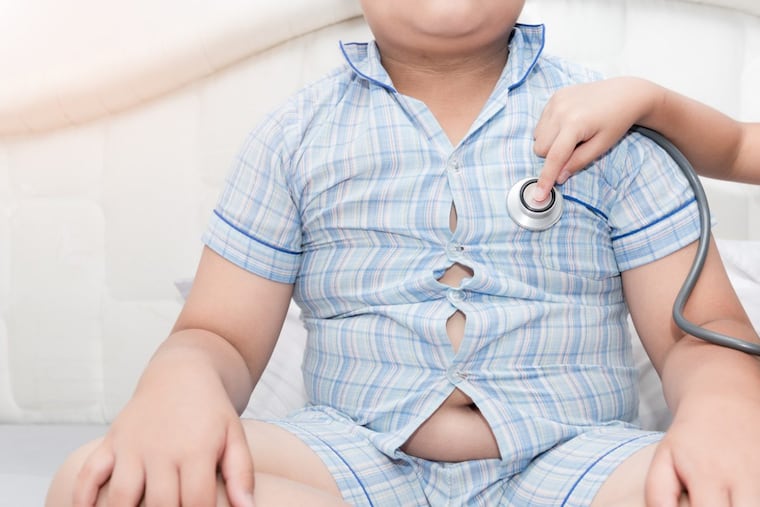Slowing down childhood obesity and early puberty with exercise and nutrition
Since the 1970s, the percentage of U.S. children affected by early puberty and obesity has continued to grow at an alarming rate.

A few weeks ago, an alarmed mom reached out to me with concerns about her 9-year-old daughter's struggle with obesity and early puberty. Rightly so, this mom was desperate for solutions on how to tackle these challenges with sensitivity, consistency, intensity, and love.
I could certainly empathize with this mom, because 46 years ago, I was that little 9-year-old confronted with early puberty. I can even still see the terrified look and tears in my mother's eyes when my menses arrived way ahead of schedule, even before my 10th birthday. Being only 9, we hadn't yet had the "talk" and I didn't even know what it was.
Since the 1970s, the percentage of U.S. children affected by early puberty and obesity has continued to grow at an alarming rate. Now it seems common to see children, and especially girls, physically maturing at an increasingly fast pace. It doesn't take a rocket scientist to see that there are some obvious connections between early puberty and rising obesity, which, according to the Centers for Disease Control, has more than tripled since the 1970s.
And despite the valiant efforts of policymakers, schools, medical experts, and parents, early puberty and childhood obesity appear to not be going away. So, what's a mother to do? While there are biological and environmental circumstances beyond our control, there are common sense strategies parents can adopt to slow down the progression of both early puberty and weight gain. Here are seven tips:
Go to the doctor
Seek advise from your child's pediatrician. Your child's pediatrician should be your partner in tackling any of your child's health concerns, and that includes weight gain and early puberty. Your pediatrician may also be able to refer you to a nutritionist or registered dietitian.
Exercise, exercise, exercise!
Keep your children fit and active. Children need daily exercise, so put the video games down and get to the playground. Also, integrate activities into your daily routine and go on family walks, hikes, and bicycle rides. You can do ice skating in winter, roller skating in the summer, and team sports and dance classes year round.
Beware of hormones in your food
This may come as a shock, but almost all commercially produced milk and meats have hormones that can disrupt our children's (and our) health. Even soy, which mimics estrogen, should likely be avoided. The good news, now many choices are available and you can choose hormone-free milk and meats. Also, we're lucky to have local organizations like Fair Food and other food activist organizations, which are providing sustainable agriculture as well as hormone-free milk and meats and at affordable prices.
Eat organic fruits and vegetables
While some people still debate whether there are benefits of going organic, I say surely it's worth a try. In addition to tasting better, eating fruits and vegetables free of chemicals and other toxic substances can likely help in detoxing your child's body. While it is sometimes tough to get kids to eat more vegetables, try some tasty roasted vegetable recipes, and throw in a fist full of fresh collards, kale, or spinach into a smoothie.
Bake better
Make better baked goods. While I know it sound weird, but you can actually replace the fat in your baked good recipes with prunes, apple sauce, and even black beans. The kids will never notice the difference. Yum!
Be aware of the products you use
Go green with household cleaners. This one may come as a surprise, but many household cleaning products, herbicides, and insecticides actually mimic human hormones. The same is also true of many personal-care products, lotions and creams. If you want to ditch these chemicals, try some of the cool recipes online for making your own natural cleaning products, soaps, lotions, and personal-care products. Trust me, the kids will love making these products, you'll be decreasing their exposure to harmful chemicals, and you'll be bringing education and STEM right to the kitchen table.
Drink plenty of water
Water should be children's (and everybody's) primary beverage, but sadly, many chemicals that can disrupt our hormones find their way into our drinking water supply. Ideally, we should drink pure spring water because it has been naturally filtered by the earth and it contains a wide variety of trace minerals that the body needs. Some of the spring water brands that I have tried are Mountain Valley, Evian, and Arrowhead Mountain, which not only taste great, but I believe, also improves hydration. The kids will notice the difference too and clamor for more pure water.